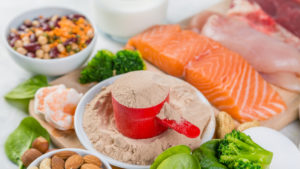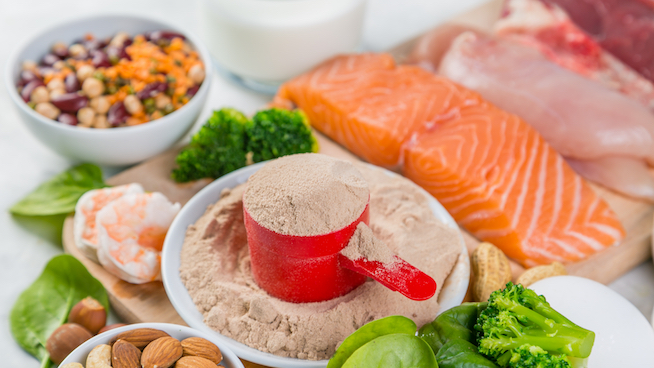PROTEIN – ALL YOU NEED TO KNOW
4 main things that most people need to know about protein.
What is it, why is it important, what are the sources and how much do you need?
By Cathal O’Shea PN1
Adapted from Precision Nutrition Article: All about Protein by Ryan Andrews
What is it?
Protein is what is known as a macronutrient and is one of the most important for many reasons. They are made up of amino acids and fall into 2 categories, essential (the body can’t make them) and they must be consumed in our diet and non-essential which the body can make for itself.
Why is it important to get enough protein?
Our bodies need proteins and amino acids to produce important molecules in our body – like enzymes, hormones, neurotransmitters, and antibodies – without an adequate protein intake, our bodies can’t function well at all.
Protein helps replace worn out cells, transports various substances throughout the body, and aids in growth and repair.
Consuming protein can also increase levels of the hormone glucagon, and glucagon can help to control body fat. Glucagon is released when blood sugar levels go down. This causes the liver to break down stored glycogen into glucose for the body.
It can also help to liberate free fatty acids from adipose tissue – another way to get fuel for cells and make that bodyfat do something useful with itself instead of hanging lazily around your midsection!
Another important factor in favour of protein is that it helps improve CCK release, which enhances satiety, meaning that it helps you feel full and satisfied after a meal. Did you ever do your food shopping after having a big meal? I can tell you it will look a lot different than if you go in and do the shopping hungry.
What are good sources of lean protein?

You have animal based, which would include but not limited to; beef, pork, lamb, wild game, chicken, turkey, duck, fish, seafood, mollusks (muscles, clams), eggs, dairy such as cottage cheese and greek yogurt.
Plant Based: Beans, legumes, peas, lentils, tofu, edamame.
Supplements: Protein Powders like Whey, Casein, Pea, Rice, Hemp.
We would try to maximise our intake from less processed natural foods, but having said that there is absolutely nothing wrong with supplementation either as long as it is from a reputable company. I think maybe protein powder has gotten a bad name by association and it is often completely misguided i.e Bodybuilders take protein, some bodybuilders take steroids, therefore protein powder = steroids.
This couldn’t be further from the truth. Whey protein powder for example is simply a bi-product that comes about in the process of making milk. Protein powders can be extremely useful particularly for people who are short on time when it comes to food prep and it is a simple way to get 20g+ of protein into you fairly quickly and easily without having to carry a chicken breast around with you in your pocket!
How much protein do you need?
How much protein you need depends on a few factors, but one of the most important is your activity level.
- The basic recommendation for protein intake:
0.8 grams per kilogram (or around 0.36 g per pound) of body mass in untrained, generally healthy adults.
i.e. 155 lb (70 kg) person would consume around 56 grams a day.
(However, this amount is only to prevent protein deficiency. It’s not necessarily optimal, particularly for people such as athletes who train regularly and hard)
- For people doing high intensity training:
protein needs might go up to about 1.4-2.0 g/kg (or around 0.64-0.9 g/lb) of body mass. 150 lb (70 kg) person would thus need about 98-140 g of protein per day.
- We need a small amount of protein to survive, but we need a lot more to thrive.
- We can only store so much protein at one time.
- The body needs its protein stores to be continually replenished, which means that you should consume moderate amounts of protein at regular intervals.
- Consuming more protein may help maintain an optimal body composition (in other words, help you stay leaner and more muscular) and a strong immune system, good athletic performance, and a healthy metabolism. It may promote satiety (i.e. make you feel full longer) and consequently help you manage your body weight.
- Amino acid (and amino acid + carbohydrate) consumption after exercise results in a positive muscle protein balance (in other words, helping muscles rebuild, which is a good thing), while the intake of no nutrients can result in a negative muscle protein balance.
Can I eat too much protein?
The short answer, unlikely. In theory if you overeat protein, this extra protein can be converted into sugar or fat in the body. However, protein isn’t as easily or quickly converted as carbohydrates or fat, because the thermic effect (the amount of energy require to digest, absorb, transport and store protein) is a lot higher than that of carbohydrates and fat so it becomes almost impossible to take too much protein in.
You might have heard the statement that a high protein intake harms the kidneys. This is a myth. In healthy people, normal protein intakes pose little to no health risk. Indeed, even a fairly high protein intake – up to 2.8 g/kg (1.2 g/lb) – does not seem to impair kidney status and renal function in people with healthy kidneys. In particular, plant proteins appear to be especially safe.
Summary and recommendations
- For basic protein synthesis, you don’t need to consume more than 1.4 to 2.0 g/kg (around 0.64-0.9 g/lb) of protein per day.
- Nevertheless, consuming higher levels of protein (upwards of 1g per pound of body weight) may help you feel satisfied after eating as well as maintain a healthy body composition and good immune function.
- You should consume some protein before and after training to ensure adequate recovery.
- Consume regular feedings of protein throughout the day.
- Make sure you get different sources of protein, not all meat based, plant, and dairy too.



